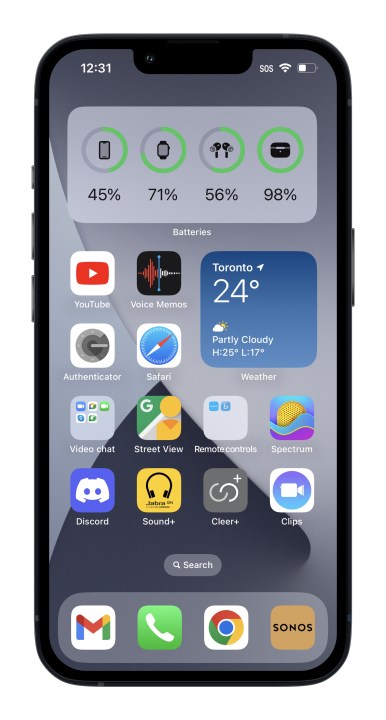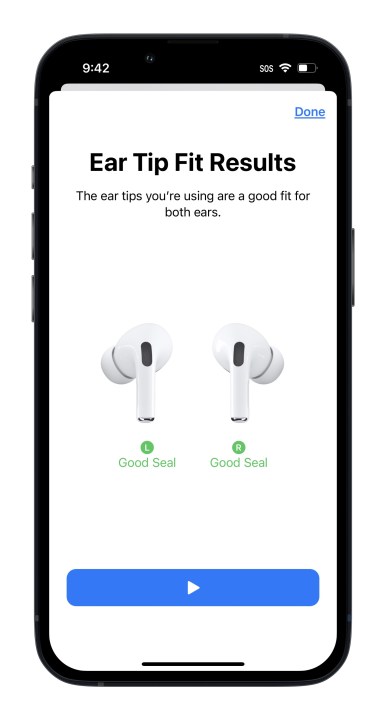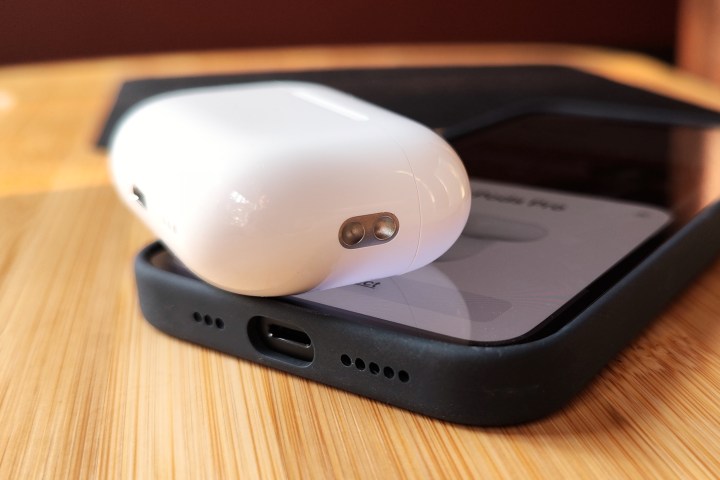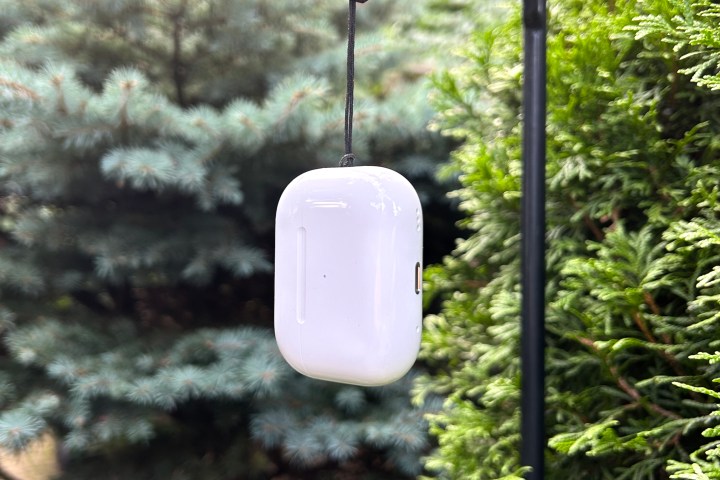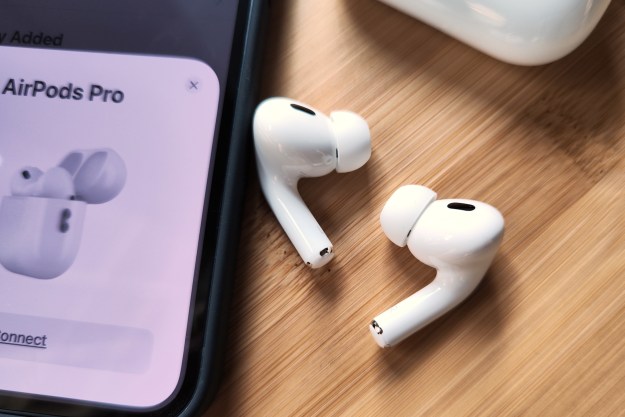
- Excellent noise cancellation
- Top-notch transparency
- Very good sound quality
- Great call quality
- Fun charging case features
- Not ideal for Android
- Still no EQ adjustments
It’s impossible to discuss wireless earbuds without mentioning Apple’s iconic family of AirPods products. And when it comes to noise cancellation, there are the AirPods Pro, and then everything else. They’re just that dominant.
With the release of the second-generation AirPods Pro, don’t expect that to change. Apple has taken what already was an incredibly successful formula and has made it better by improving existing features like noise cancellation, sound quality, and transparency, and also by adding new twists from the Apple ecosystem like better Find My integration and personalized spatial audio.
That’s brilliant news for Apple fans. But it means everyone else will still have to look elsewhere to get a compelling wireless audio experience.
Just how good are the AirPods Pro 2? Let’s check them out.
Editor’s note: Apple has replaced the AirPods Pro 2 in this review with a newer variant. They’re still called AirPods Pro (2nd Generation), but the charging case now uses a USB-C connector instead of an Apple Lightning port. There are some additional minor differences, which we discuss in our full Apple AirPods Pro 2 with USB-C review.
Video review
What’s in the box?
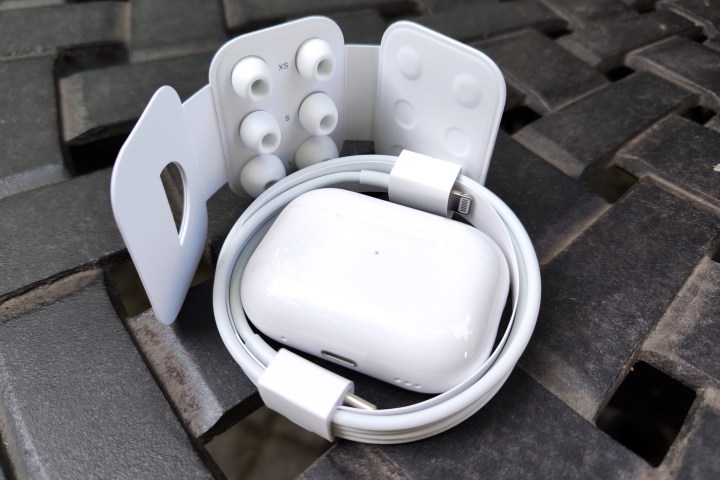
In addition to the AirPods Pro 2 and their charging case, Apple provides a generous set of extra eartip sizes (now including extra small), plus a 41-inch Lightning-to-USB-C cable for charging. That’s a much longer cable than what most wireless earbuds ship with, but Apple continues to ignore the fact that not all of its customers have computers or chargers that use USB-C just yet. Maybe it’s just me, but a USB-C-to-USB-A adapter would have been a welcome addition.
The box itself and all of its internals are 100% recyclable paper and cardboard.
Design
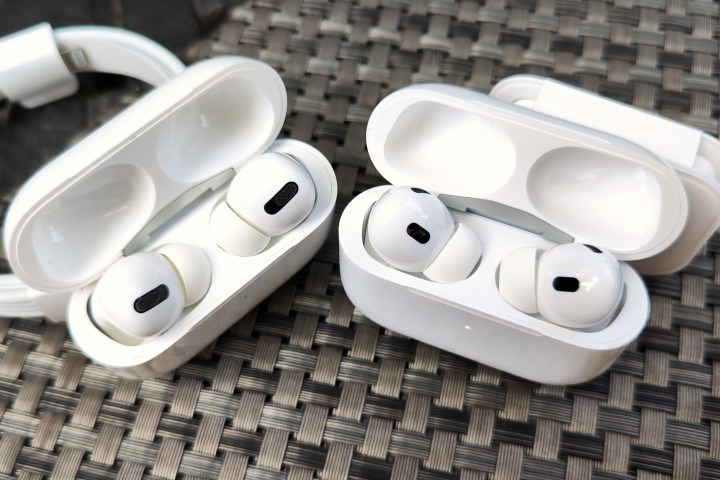
You’re going to have to look closely — and I mean really closely — to see where Apple has made changes from the first-gen AirPods Pro to the AirPods Pro 2, at least on the outside. In terms of size and shape, the earbuds and the charging cases are identical. You can even swap the earbuds and cases from one generation to the other and they’ll fit together perfectly. But do not do this. Apple says a firmware mismatch will keep them from charging if you do this, and indeed it does. But at least nothing exploded or got stuck when I tried.
An identical shape means the AirPods Pro remain some of the comfiest wireless earbuds you can buy. But it also means they’re still not as secure as some folks may want. You absolutely can work out in them (the second-gen earbuds keep the IPX4 water resistance rating and the charging case is now similarly protected), but they might need regular adjustments.
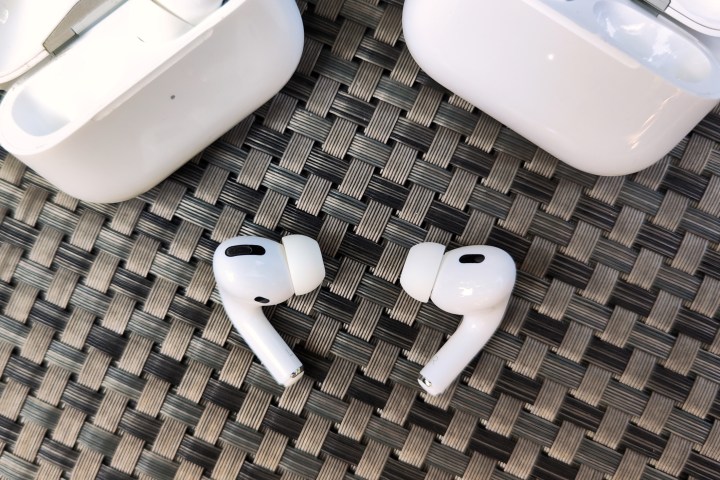
Look closer and you’ll see a few differences. The pressure-relief vents have been moved higher on the newer earbuds, and a new type of wear sensor knows the difference between human skin (like the inside of your ear) and other objects like the inside of your pockets, should you be in the habit of leaving your charging case at home.
Speaking of the charging case, it now has a built-in lanyard loop, Apple’s U1 chip for precise locating in the Apple Find My app, support for Apple Watch/MagSafe/Qi wireless charging, and a tiny speaker that can be used for a variety of feedback tones, which we’ll discuss in a moment.
The whole package now weighs a wee bit more, likely thanks to all of those extra charging case features: 2.19 ounces versus the first-gen’s all-in weight of 1.98 ounces. Inside the second-gen earbuds lies Apple’s new H2 chips, which do all of the heavy lifting for the new-and-improved features.
Controls and connections
The first-gen AirPods Pro’s easy-to-use controls make a comeback, with a simple squeeze-to-click gesture on each earbud’s stem. Press once for play/pause or call answer/end, twice to skip forward, and three times to skip back. Press-and-hold also is available and can be customized for each earbud, allowing you to activate Siri or control active noise cancellation (ANC) mode.
The new skin-sensing wear sensors absolutely live up to their promise.
The second-gen buds add volume control, a feature that AirPods fans have been asking for. To use it, you put your thumb against the back of the stem, the same as you would for a squeeze gesture. But instead of squeezing with your index finger, you slide it up or down on the stem. Each complete slide gesture moves the volume up or down one notch.
At first, I really struggled with this new gesture. But then I figured out the right technique — your index finger has to begin its slide starting above or below the flat sensor area in order to be consistently recognized. If you start on the sensor itself, it’s much less likely to work.
When you nail it, not only does the volume adjust as expected, but you also get a very faint confirmation tone.
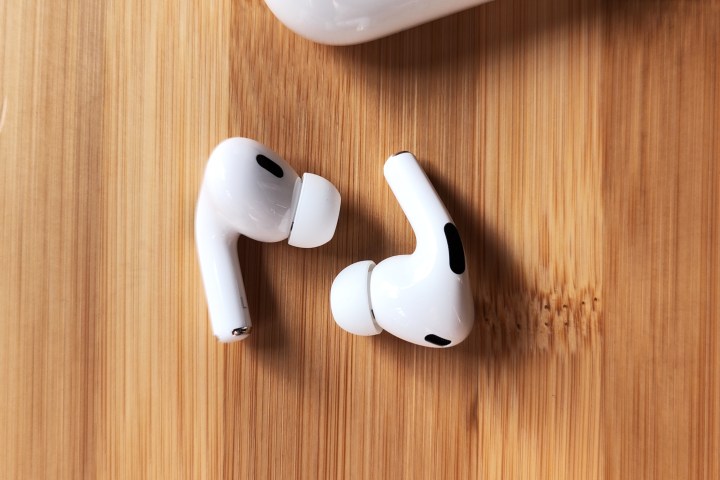
The new skin-sensing wear sensors absolutely live up to their promise. I tried to fool them with fabrics, plastics, leather, and metal, and none produced a false positive. The only exception was my fingernail, but given that’s just a layer over real skin, I’d say it’s an exception that proves the rule. And they pause and resume your tunes almost instantly as you pop them in and out of your ear.
It’s worth noting that in iOS 16 (which is a requirement if you want to get the most out of these earbuds), the settings for the AirPods finally are in their own dedicated area within the Settings app, instead of buried in the Bluetooth menu. It offers a wealth of great options including a fit test, preferences for ANC, detailed battery status, and gesture customization. The case will even communicate with your iPhone periodically over Bluetooth Low Energy to give you an accurate battery level, even when you’re not using the earbuds.
The only thing missing — or should I say, still missing — is a way to adjust EQ. Apple still stands by its Adaptive EQ as the only adjustment you need — in other words, “trust us.”
Connecting the AirPods Pro 2 to your iOS device is laughably easy. Just flip open the case lid next to an unlocked iPhone or iPad and it’s instantly recognized. One tap on the on-screen animation and you’re in business.
Apple says they have richer sound with more clarity … I think that’s spot-on.
And even though Apple still doesn’t support Bluetooth Multipoint for simultaneous device connections, its automatic device switching works almost as well — and one could argue it might even be better than Multipoint if you have several Apple devices you use on a regular basis like an iPhone, iPad, Mac, and an Apple Watch. It’s not quite seamless — on a few occasions, my Mac would not pump volume through the AirPods even though it indicated it was connected to them. My two test iPhones — an iPhone 11 and iPhone 14 — also appeared to arm wrestle over which one should take precedence over the AirPods connection. But I’ll chalk that up to an unusually complicated setup (and possible user error) on my part.
The AirPods Pro 2 use Bluetooth 5.3, the latest and greatest version of the wireless standard. But Apple is only scratching the surface of what Bluetooth 5.3 can do. Not only has it declined to support Multipoint, it has also remained silent on other features like LE Audio, including the new LC3 audio codec, and Auracast for public Bluetooth broadcasts.
Still, what matters most is that the connection is strong and stable as long as you remain within about 25 feet indoors and within 35 to 40 feet outside.
Sound quality
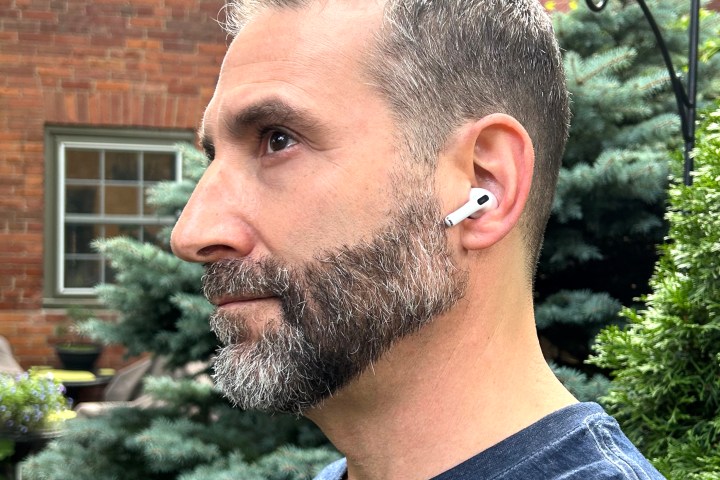
Apple says it has endowed the AirPods Pro 2 with a new, low-distortion set of drivers and new high dynamic range amplifiers for “richer sound with more clarity and consistency across volumes and a wider range of frequencies.” I think that’s spot-on.
The first-gen buds sounded good — way better than any previous AirPods — but they were routinely outclassed by competitors like Sony’s WF-1000 series (XM3, XM4) and Sennheiser’s Momentum True Wireless 3. These rival earbuds still have an edge over the second-gen AirPods Pro — especially when connected to Android handsets — but it’s a slimmer lead. More important: Unless you sit yourself down for a truly critical listening session with a handpicked set of lossless, hi-res tracks, I just don’t think you’ll be able to hear the difference.
For ANC and transparency the AirPods Pro 2 and Bose QuietComfort Earbuds II are both excellent. But the AirPods Pro are better.
The new AirPods offer up a detailed performance, with plenty of punchy bass, and very clear high frequencies. The soundstage is pleasingly wide, even if it lacks the pin-drop precision of the Technics EAH-AZ60 or Astell & Kern AK UW100. The AirPods Pro 2 sound so good, I can’t help wondering how much better they could sound if Apple actually supported higher quality codecs like Sony’s LDAC or Qualcomm’s aptX Adaptive. Still, what the AirPods may lack in terms of audiophile precision, they make up for in immersion, especially if you delve into head-tracking spatial audio.
Speaking of spatial audio, personalized spatial audio is a new feature in iOS 16 that I won’t get into here because it’s not an AirPods Pro 2 exclusive (it works on the first-gen, third-gen AirPods, and AirPods Max too). But I did try it, and I could definitely hear an improvement to the way Dolby Atmos Music sounded. I’ll be posting my full thoughts on the new feature shortly.
Noise cancellation and transparency

On literally the same day that Apple announced the second-gen AirPods Pro, Bose debuted its second-gen QuietComfort Earbuds, along with the claim that they offered the best ANC you could get, period. And for me, it was a claim that proved true … for about a week. Then I got my hands (and ears) on the new AirPods Pro. Apple’s buds don’t beat the QuietComfort Earbuds II on noise cancellation — in fact, they are so close, I couldn’t pick a winner if I tried. But I prefer the AirPods Pro anyway.
It comes down to execution. Bose’s ANC system, while impressive in every way, nonetheless produces a noticeable hiss when you’re in a relatively quiet area without music playing. That hiss is a constant reminder that there’s technology working in the background trying to keep you free from annoying noises. With the AirPods Pro, on the other hand, all you get is silence.
Caleb would exclaim, “Wow, um, did you hear that truck?” and inevitably, I’d reply, “No, what truck?”
Both products are also too close to call on transparency listening, with incredibly clear reproduction of the outside world, including your own voice, but again, I prefer the AirPods because of how transparency is managed.
In this case, I’m referring to Bose’s ActiveSense tech, which constantly monitors for very loud sounds when you’re in Aware (transparency) mode and attempts to tamp them down to safe listening levels. The AirPods Pro 2 do the same thing — Apple calls it Adaptive Transparency. Both do the job, but the AirPods Pro do it better.
Here’s an example: We have one of those Vespa-style electric scooters. When you turn it off, it emits an absolutely ear-piercing 100-decibel shriek, which I have yet to successfully disable. It’s so loud you can hear it a block away. And when it’s in an enclosed space — like our garage — it’s painful. With the QuietComfort Earbuds II, that shriek was greatly reduced, but was still a bit uncomfortable for my liking, while the AirPods Pro 2 eliminated the high-frequency spike, leaving me with a sound I could hear clearly, without wincing.
You can turn Adaptive Transparency off if you find it interferes with sounds that matter to you, but in my brief time with these earbuds, it was never a problem and I strongly recommend leaving it on.
Call quality

The AirPods Pro always have been reliable companions for calling, but they’re even better now that Apple has given the second-gen model enhanced background noise cancellation. Digital Trends editor-at-large Caleb Denison and I did a series of phone calls on both versions to hear the difference for ourselves, and it got pretty amusing at times. Caleb would exclaim, “Wow, um, did you hear that truck?” and inevitably, I’d reply, “No, what truck?” and so it would go as each of us gave the other a color commentary on sounds that simply couldn’t be heard on the other end of the line.
It’s not perfect; the price for all of the magic noise suppression is a slightly muffled voice quality, but it’s only an issue in loud, outdoor settings. Inside, your callers will hear you clearly and effortlessly, almost as if you were speaking right into your phone’s mic.
Battery life
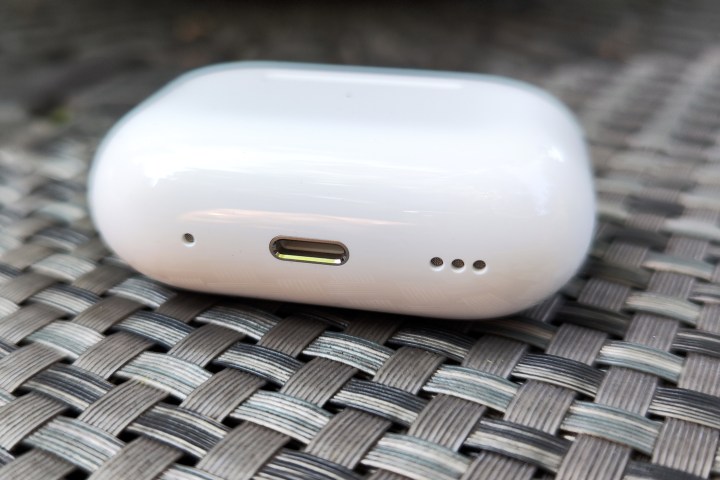
Earbuds like this have very small batteries. That’s just physics at work. But battery life does tend to get a little better with every new generation. The second-gen AirPods Pro are now up to six hours per charge under normal conditions with ANC on and volume set at 50% which, given how good the ANC is, might just be sufficient for most listening.
It will take a hit if you push it: I used the ANC function on its own for a long motorcycle trip and the roar from the wind and my bike’s engine/exhaust probably taxed those H2 chips considerably. I only got about five hours before they gave me that dead-battery warning tone.
A quick five-minute charge gives the earbuds an extra hour of use, so you’ll be able to get back to your in-flight movie pretty quickly if the battery should conk out.
Throw in the four full charges in the case (more than the typical two or three you get on other earbuds) and you’re now up to 30 hours before you need to go in search of electricity.
Speaking of the case, I need to say two quick things: first, the precision finding via Apple’s “Find My” feature that’s enabled by the U1 chip is awesome, as is the built-in speaker. Just getting a confirmation tone for wireless charging is worth the upgrade. But second — really Apple, you put a lanyard loop on this thing but couldn’t give us an actual lanyard in the box? You can buy them on Amazon for $7 for a six-pack, so what would it have cost to include just one? 10 cents? Not. Cool.
A total no-brainer
So there you have it. Apple’s second-gen AirPods Pro cost the same as the first generation, but have a slew of meaningful improvements that put them at the top of the heap for features like ANC and transparency. For any Apple fan who needs a set of wireless earbuds, they’re an obvious (and excellent) choice.
Android or PC users could buy them too — their best features (comfort, ANC, improved sound quality, volume control, skin sensors, adaptive transparency, better battery life, and call quality) would all work just fine — but without any access to your voice assistant, settings, spatial audio, higher-quality codec support, or the Find My feature, I’m not sure it’s worth it. Given how good Google’s new Pixel Buds Pro are, you might just want to save yourself the $49 and get a set of buds made for your phone.

